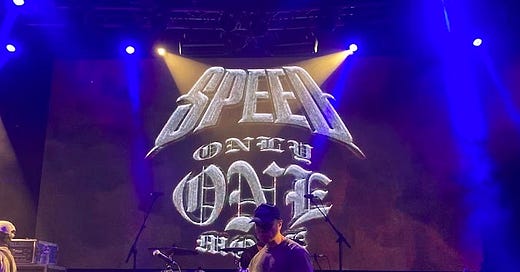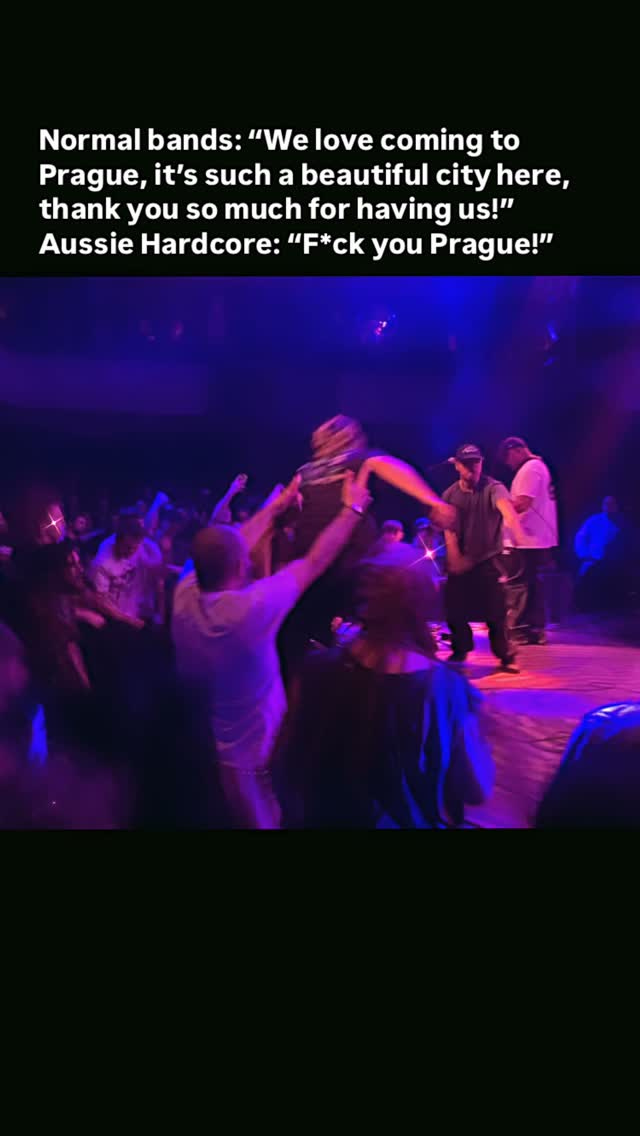There is a humble group of Sydney musicians currently taking the world by storm. They electrify audiences everywhere they go and recently did two weekends at Coachella to rave reviews. Speed right now is the little band that could.
I was lucky enough to finally catch them a month ago in Prague. It was a humbling reminder of what it means to come up in a subculture. After more than ten years away from home, the feeling of the east coast Aussie hardcore scene is still something I can’t find replicated anywhere else.
As Speed took the stage in support of the iconic Madball, it was mindblowing to see a group of Czech hardcore enthusiasts do their spin kicks, crowd jumps and mic grabs, screaming the lyrics with even more gusto than my 35 year old legs or lungs could muster.
Speed frontman’s Jem Siow expressed his gratitude at being on a Madball tour, reflecting on practising “flawless spin kicks” as a kid with posters of Freddy Cricien on his wall. Freddy later commented on the longevity of hardcore as a global scene (Madball being founded almost 40 years ago), while unleashing the energy and fury of a man half his age. “Hardcore lives!” they would occasionally shout from the stage.
Having fully exerted myself during Speed’s set, I hung back during Madball. I marvelled at the unity of the global hardcore scene. Perhaps now in some remote village, there is a Czech kid following Instagram and Tik Toks of Speed’s unhinged live shows, practising their own spin kicks and stage dives.
With footage of Coachella now also fresh in my mind, the importance of the hardcore subculture really strikes a chord. We’ve had acts like Knocked Loose and Turnstile in recent years, but the very ethos of hardcore seems antithetical to the influencer-heavy focus of such a festival. Are organisers including more heavy acts in an attempt to expand the genre’s popularity?
When compared to the other main genres represented at Coachella - hop-hop, club/EDM, indie pop, Kpop, even pop punk by way of Saturday headliners Green Day - it seemed that all have fallen victim to commodification and corporate greed. As Reggie Watts concluded: “No care. No reverence. Just vibes curated for influencer culture.”
Which leaves us with hardcore punk. Dare I say, is it the last surviving subculture? The decentralised, local aspect of hardcore is crucial to many of its artists’ identity. Speed is proudly Sydney-based and reps both Australia and Asian-Australia hard*, just as Madball is staunchly NY Hardcore. It’s hard to package that as a commodity to be sold globally.
Furthermore, hardcore’s DIY aesthetic and anti-establishment ideals also put it at odds with a large, mass-appeal festival like Coachella. While I’m glad bands like Speed are given the chance to play larger stages and get their bag, there doesn’t seem to be any way that I can see a Brat style summer marketing scheme or meme campaign for any of these bands. You simply can’t replicate that on a global scale.
It is something that can only be experienced in the local clubs and dirty, sweaty venues. I think back to nights spent at youth centres and dive bars, jam packed shoulder to shoulder with your fellow hardcore kids. No amount of screen time can relate the feeling of that Converse shoe smacking you in the head while you block elbows from left, right and centre. Which might explain why Speed played two local shows in LA and Las Vegas during their week off between Coachella sets.
For that reason, and coming back to their local Prague show, a band like Madball can still carry on 40 years later on in authenticity. Rather than seeing it as competition, they are proud to do it side by side with young guns like Speed without any qualms.
It’s about unity, it’s about having a good ol’ time doing your spin kicks and celebrating that after all these years, from shore to shore and back again, hardcore lives.
* Fun fact! Speed aren’t the first Asian Australian act to play Coachella. That honour belongs to Rosé of Blackpink , although she is technically Kiwi, she grew up in Melbourne.





